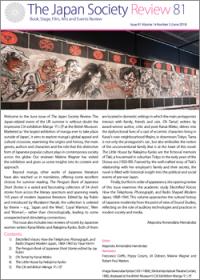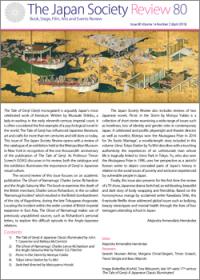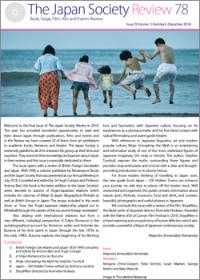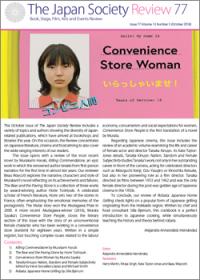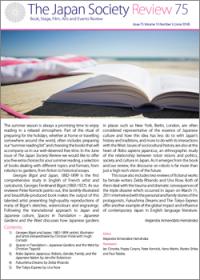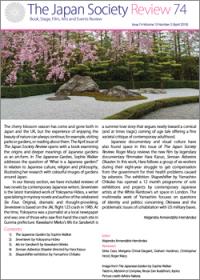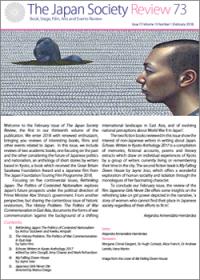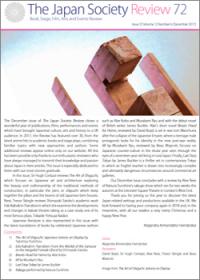The Japan Society Review
The Japan Society Review is an digital publication covering Japan-related books and films, as well as theatre and stage productions, tv series and exhibitions. Published since 2006, it is released now on a quarterly basis and is available online on our website. Its purpose is to inform, entertain and encourage readers to explore the works for themselves.
The Japan Society Review is possible thanks to the work of volunteers who dedicated their time and expertise to help us to promote the learning and understanding of Japanese culture and society.
To become a reviewer, please fill the form here and let us know a little about you, your professional or academic background, your interest, passion or expertise regarding Japan and the type of works you would like to review.
If you have any questions, please contact reviews@japansociety.org.uk.
Issues (PDF)
Issue 81 (June 2019, Volume 14, Number 3)Our June issue covers the impressive Citi exhibition Manga マンガ at the British Museum, along with The Penguin Book of Japanese Short Stories, two novels by Japanese women writers Kanai Mieko and Nakajima Kyoko and finally, the academic study Electrified Voices: How the Telephone, Phonograph, and Radio Shaped Modern Japan, 1868-1945.
Issues (PDF)
Issue 80 (April 2019, Volume 14, Number 2)This issue of The Japan Society Review opens with a review of the catalogue of an exhibition held at the Metropolitan Museum in New York in recognition of the one thousandth anniversary of the publication of The Tale of Genji. Both the catalogue and the exhibition illuminates the importance of Genji in Japanese visual culture.
Issues (PDF)
Issue 79 (February 2019, Volume 14, Number 1)Welcome to the first issue of The Japan Society Review in 2019. Thanks to our team of dedicated reviewers, we again hope to bring you details of the latest and most interesting publications, films and events related to Japan. As in previous issues, we will maintain a balance between academic, non-fiction publications and works of popular culture.
Issues (PDF)
Issue 78 (December 2018, Volume 13, Number 6)Our last issue of 2018 focuses on international relations, Japanese linguistics, art and pop culture. We also present a review of an unusual travel book and finish with a look at the award-winning movie Shoplifters.
Issues (PDF)
Issue 77 (October 2018, Volume 13, Number 5)In this issue, the Review concentrates on Japanese literature, cinema and food aiming to also cover the wide-ranging interests of our readers.
Issues (PDF)
Issue 76 (August 2018, Volume 13, Number 4)This issue of The Japan Society Review is dedicated to the memory of Sir Hugh Cortazzi, former British Ambassador to Japan (1980-1984) and Chairman of the Japan Society (1985-1995), who died on Tuesday 14 August 2018, at the age of 94. Sir Hugh was the most distinguished Japanese specialist of his generation in the Foreign Office, and his association with the Society began long before he became Chairman.
Issues (PDF)
Issue 75 (June 2018, Volume 13, Number 3)In the June issue of The Japan Society Review we would like to offer you five extra choices for your summer reading, a selection of books dealing with different topics and formats, from robotics to gardens, from fiction to historical essays.
Issues (PDF)
Issue 74 (April 2018, Volume 13, Number 2)The April issue of The Japan Society Review opens with a book examining the origins and deeper meanings of Japanese gardens as an art-form.
Issues (PDF)
Issue 73 (February 2018, Volume 13, Number 1)In this issue, we include reviews of two academic books, an anthology of short stories by writers based in Kyoto, a book which received the Great Britain Sasakawa Foundation Award and a Japanese film from The Japan Foundation Touring Film Programme 2018.
Issues (PDF)
Issue 72 (December 2017, Volume 12, Number 6)The December issue of The Japan Society Review closes a wonderful year of publications, films, performances and events which have brought Japanese culture, arts and history to a UK audience. This issue is especially dedicated to our reviewers, with our most sincere gratitude.


